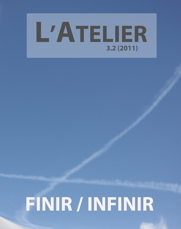De l’obsession du septentrion : Rudy Wiebe et le cas Albert Johnson
Mots-clés :
Wiebe, Rudy, Altérité, PaysageRésumé
Cette étude a pour objet la nouvelle que l’écrivain canadien Rudy Wiebe consacra à la poursuite d’Albert Johnson dont la fuite au cœur de l’hiver polaire fit en 1932 les gros titres de la presse nord-américaine. Si la réécriture du fait-divers mobilise un ensemble de topoi aisément repérables, certains de ses éléments constitutifs tels que la tache et le bruit offrent davantage de résistance aux mises en forme de la nouvelle. Entièrement analeptique, le récit part du corps inerte de Johnson dont il retrace ensuite la course folle à la faveur de quatre étapes qui ramènent le lecteur jusqu’au mobile initial. Renversant le cours des choses, la progression du récit suit les méandres de trois fleuves, The Eagle, The Rat, The Peel qu’elle descend en direction de l’océan Arctique pour aboutir au moment apertural où du paysage surgirent une voix puis un nom. C’est sur cette voix autochtone qu’il conviendra de s’interroger puisque c’est sur sa rencontre que la nouvelle s’infinit, c’est-à-dire qu’elle se donne pour fin, comme but et comme direction, la question du rapport à l’autre.
Sensational reports on the pursuit of Albert Johnson held North American readers in thrall during the winter of 1932, while “The Mad Trapper” opposed extraordinary resistance to the Royal Canadian Mounted Police sent to arrest him in his cabin on the Rat River, a tributary to the Peel in the North-West Territories. This article analyses the short story Canadian writer Rudy Wiebe has devoted to the reconstruction of events that have never ceased to intrigue Johnson’s contemporaries as well as the historians who subsequently sought to elucidate the man’s fierce silence. Detailed attention will be paid to the retrospective structure of “The Naming of Albert Johnson,” as the narrative starts from Johnson’s inert body, loops back in time and space to retrace four major stages in the fugitive’s itinerary until his inaugural encounter with an Aboriginal presence. The extended analepsis serves to question the finality of Johnson’s mad retreat into an Artic silence insofar as it engages with the re-creation of the man’s motivations. The analeptical composition of the narrative also has formal consequences that turn Johnson’s story upside down, thereby forcing the reader to reconsider the literary topoi associated with Canadian North along with the place of the Aboriginal in a landscape traditionally portrayed as both empty and silent.
Publiée
Numéro
Rubrique
Licence
-
L’envoi spontané d’un article à la rédaction de L’Atelier implique l’autorisation de publication et la cession des droits dans les limites établies par la loi de propriété intellectuelle.
-
L’Atelier conserve les droits de reproduction des articles publiés, quelque soit le support : internet, CD ROM, réimpression, photocopie, etc.
-
L’auteur conserve le droit de publier ultérieurement son article déjà paru dans L’Atelier avec la seule obligation de mentionner le nom de la revue comme source de la première publication.


